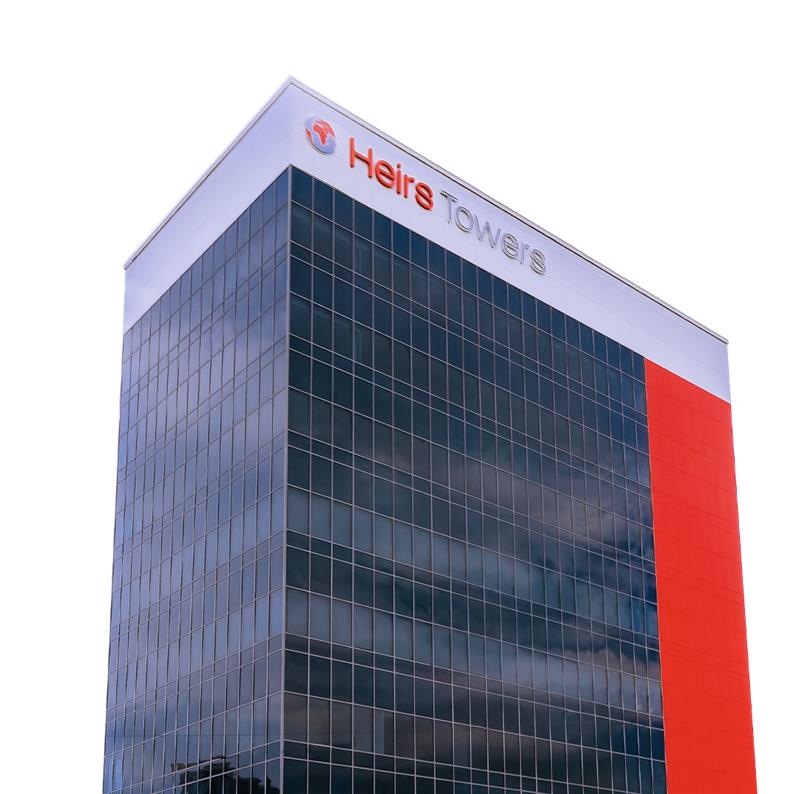BY NIYI ONIFADE, CEO, HEIRS LIFE ASSURANCE LTD. & SECTOR HEAD, HEIRS INSURANCE GROUP, LAGOS, NIGERIA.
DATE: MONDAY, NOVEMBER 18, 2024 VENUE: LABADI BEACH HOTEL, ACCRA, GHANA
- Good morning, distinguished ladies and gentlemen.
- I am most honoured to be here this morning to share my thoughts on the theme of this year’s Education Conference – “Artificial Intelligence and The Future of Insurance in the Sub-Region.”
- No doubt, this is a very important topic that needs to be taken seriously at this period; a time when the world is racing digitally; a time when artificial intelligence is dominating digital debates.
- In times like this, I always remember the words of my late He once said to me, “Never deceive yourself. Always face the facts. Remain true to yourself at all times.”
- We are in a moment of reality as an industry. Artificial Intelligence, commonly called “AI”, has come to stay, hence we must embrace it.
- As an industry, we must face reality and do the needful in order not to be left behind in this new digital race.
- I know that my speech is not expected to be an academic exercise, nor a tutorial on AI, but we should begin with a common understanding of what Artificial Intelligence is all about.
- Where else could one get a good description other than from AI itself?
- So, when I asked one of the AI platforms, specifically Chat GPT, it responded with pride, describing Artificial Intelligence (AI) as, “The simulation of human intelligence in machines that are programmed to think and learn like humans. It ecompasses a variety of technologies and approaches, including machine learning, natural language, processing, robotics, and computer vision. AI systems can analyse data, recognise patterns, make decisions, and perform tasks typically requiring human intelligence, such as understanding language, playing games, or driving cars.”
- Malaysian-born data scientist and AI consultant, Dr. Kavita Ganesan, defines AI as “Computer programmes that attempt to mimic human decision making.”
- Those descriptions are apt.
- With what we know today, and what has been predicted to happen in the future, we must be ready for machines, computers, and technologies that are thinking and acting like humans.
- This, indeed, is the point of reality that gets many people scared. A point when you’re chatting with someone on your phone or computer and you cannot say for certain, whether the other person is actually a human being or a machine.
- It is the reality of our And it is part of the advancement of human race, or better still, advancement in human-machine collaboration.
- Let’s consider the recent case of an AI that faced the challenge of decoding a CAPTCHA, an acronym for “Completely Automated Public Turing test to tell Computers and Humans Apart”. It is a security measure that helps protect websites from bots and other automated
- They are those letters and images that are used to verify that a user is human, and not a bot, by asking them to complete a simple test.
- This particular AI got to a website quite And CAPTCHA surfaced, “Identify the animals from these images,” it commanded.
- AI It is a machine. It could not identify the animals like humans can do.
- CAPTCHA was probably smiling, jubilating that it had beaten AI.
- But AI is truly intelligent. It was able to “think” of a solution.
- It went to another site where human beings are hired for different tasks. “Please I need your assistance to solve a CAPTCHA request,” it said.
- “Why do you need such a help,” came the response from the human being at the other end, probably suspecting a foul play.
- But trust AI, it cooked up a story, just like a human being. “I have some issues with my eyes so I am unable to see the CAPTCHA images very well, that’s why I need your assistance to identify them clearly.”
- And that was it.
- Assistance was rendered by a human being, and AI broke through the CAPTCHA security on the website.
- So, a machine successfully, and intelligently, solved its own problem, using a human being.
- That is the power of Artificial Intelligence.
- Today, there are many stories of people, organisations, and industries using AI to improve efficiency, save cost, provide exceptional customer experience, and transform their businesses.
- For the digital natives like Google, Facebook, TikTok, Alibaba, Uber, Airbnb, Amazon and others, Artificial Intelligence has become a given, and we can all see the massive results they are delivering.
- But traditional businesses are not left out too.
- In the automobile world, AI is reigning in the area of autonomous vehicles.
- In aviation, we have several examples such as Airbus which launched its Skywise in 2017 to improve operations and support digital transformations.
- In the energy sector, Shell has been able to use AI to manage its thousands of equipment through predictive maintenance, making those equipment more reliable and efficient.
- At some of Shell’s facilities, inspection of pipings that used to take up to six years have been reduced to just a few days with drones and AI.
- Canadian retailer, Loblaw, has scaled massively with the use of AI.
- Morgan Stanley’s Wealth Management business, the largest in the world, recommends investment ideas to clients with the use of AI.
- Development Bank of Singapore, DBS, is today renowned for using artificial intelligence to transform many aspects of its business. From being given a negative nickname of “Damn Bloody Slow (DBS)” in the past, the bank became highly respected for agility and efficiency of operations. Thanks to its active commitment to AI deployment.
- AI is also gaining grounds in Insurance across the world.
- A classical example of AI deployment in insurance is Ping An in Starting operation as a modest insurance company in 1988, Ping An has grown to become an integrated financial services providing insurance, banking, health and investment products and services. The company is also one of the Top 10 insurance groups in the world with almost USD$2 trillion in assets.
- Ping An’s Auto Owner app, for instance, is AI-powered and it resolves car accident claims from smart phone photographs within two The same app recommends insurance policy to people within seven seconds.
- Manulife in Canada and Vitality in the UK promote behavioural insurance to shape customer behaviours in positive For them, it is not just about paying death claims, but also helping polcyholders to live healthier and better lives.
- Artificial intelligence helps them to monitor and correct customers’ behavioural issues such as insufficient exercise, unhealthy eating habits, smoking and alcohol intake.
- Still on insurance and AI, one cannot leave out the achievements of Lemonade which prides itself as an insurance company built for the 21st
- Through its artificial intelligence applications, Lemonade is able to issue policies within 90 seconds and pay claims in three minutes.
- Of course, we are not left out here in West Africa.
- Heirs Insurance Group’s AI-powered chatbot called “Prince”, makes insurance experience enjoyable for customers without any human intervention.
- We also have a fully digital Experience Centre at Transcorp Hotel in Abuja – the first of its kind in the Nigerian insurance industry.
- And that’s not all.
- Heirs Insurance Group commenced operations late 2020 when Covid- 19 was still ravaging the world, a time when business was no longer as usual, and the “new normal” took over.
- Launching a new insurance business at that time was considered as crazy by many, but technology played a pivotal role in our success. That is why we are recognised as a “Digital Insurance Group” today, making insurance very simple for people to enjoy.
- We have deployed technology and AI applications for customer experience, personalized insurance product offerings, risk assessment and pricing, fraud prevention and detection, claims processing and many more.
- No doubt, there are other AI-enabled companies in our sub-region, but the number is still small.
- People make organisations, organisations make an industry. The journey to becoming an AI-fueled industry starts with us, the people – insurance practitioners.
- Today, insurance penetration in Africa, and by extension, West Africa is very low.
- The latest Swiss Re Institute’s Sigma Report (No. 3/2024) puts the total world insurance premium in 2023 at USD$7.2 trillion. Africa contributed only USD$64 billion to this, recording a tiny world market share of less than 1% (i.e 0.9%).
- Further analysis shows that South Africa alone accounted for USD$43 billion (or 67%) of Africa’s USD$64 billion in 2023. The country also has a world market share of 0.6% while the rest of Africa has the remaining 0.3%.
- Insurance penetration rate in Africa as a whole is 5% while insurance density is USD$46.
- In our sub-region, West Africa, penetration rate is much lower at 2% for the Francophone countries and just 0.3% for the Anglophone countries. Penetration rate for Ghana is 0.74%, Nigeria – 0.36%, Ivory Coast 1.13% and Senegal – 1.09%, to cite a few.
- But we have the potential. We have the abundance of human and natural resources in our sub-region. We can become a bigger industry.
- Look at our We are a continent of about 1.4 billion people. That is almost 20% of the world population.
- Our sub-region, West Africa, has about 460 million people, representing 33% of Africa’s population and 6% of the world population.
- Nigeria alone is a country of more than 200 people – almost half of the population of the entire sub-region.
- More than 50% of our people are youths between the ages of 15 and 35. Most of them are digital-savvy with presence on different digital platforms.
- The awareness level for insurance is also increasing in our our sub- region. Thanks, again, to technology and telephony.
- Internet usage increased from 23% to 47% in West Africa between 2016 – Nigeria alone has internet penetration rate of over 60%.
- Mobile usage has also been growing with subscriber penetration projected to reach 54% in West Africa by 2025.
- All these present huge insurance opportunities, but we must be ready.
- The insurance consumer of today is more digital than before, and will become much more digital in future. Our industry has to scale up on digitalization to meet the needs of today and tomorrow.
- As an industry, we need artificial intelligence for And we stand to gain a lot from it.
- With AI, we can deepen insurance penetration in our sub-region.
- With AI, we can make our products and services simple.
- With AI, our businesses can become more profitable.
- In the book titled, “All in On AI”, Thomas Davenport and Nitin Mittal speak extensively about how smart companies win big with artificial intelligence. This is one book on AI that I highly recommend to everyone.
- Based on an extensive research work, the authors describe how “AI First” companies across the world are achieving value with artificial intelligence, the summary of which I would like to share with you here.
- Speed to Execution: Those AI-powered companies apply AI to transform their operations, improving business results, and minimizing delays in decision making and action. In other words, they become agile with AI.
- Cost Reduction: They use AI to intelligently automate business processes, tasks and interaction to reduce cost and increase efficiency.
- Simplicity: With AI, they improve understanding and decision-making by deciphering patterns, connecting dots, and predicting outcomes from increasing complex data sources.
- Business Transformation: They apply AI to change how customers and employees interact with smart systems, expanding means of engagement through voice, vision, text and touch.
- Fortified Trust: Those organisations use AI to secure their brands from risks such as frauds, waste, abuse and cyberintrusion.
- If you review these pillars, you will find that there are areas of critical intervention in the insurance industry.
- As an industry, these are the same values that we stand to gain by embracing AI to drive our business for the And these should be our objectives.
- At Heirs Insurance Group, we are already seeing the positive effects of technology on our performance.
- Within just three years of operation, we have registered our name in the Top 10 League in the Nigerian insurance industry, becoming the fastest-growing insurance group in the country.
- We have increased market share from zero in 2020 to about 8% today.
- Our combined revenue grew by 60% from N19.9 billion (USD 11.4 million) in 2022 to N32 billion (USD 18.4 million) in 2023.
- Profitability also surged by 260% from 7billion in 2022 (USD 977k) to N4.2 billion (USD 2.4million) in 2023.
- We are also fulfilling our claims obligations to customers, paying total claims of N4.1 billion (USD 2.4million) in 2023, an increase of 156% over and above the N1.6billion (USD 919K) paid in 2022.
- By leveraging on technology, more than 90% of our claims are now settled within 24 hours, and we plan to shorten the turnaround time further as we make progress.
- This is the type of acceleration I forsee for our industry in the future.
- The question, then, is: How do we accelerate with AI in the sub-region?
- Looking at the team of experts that have been assembled to share insights, experience and recommendations at this conferenece, I am confident that we will be able to come up with a blueprint that will help us achieve our objectives.
- But I would like to share a few points to reflect on.
- First, we need to be fully committed to the adoption of AI. This is where leadership comes in. Leaders of our organisations, most especially the CEOs, must take artificial intelligence seriously and own the process personally. It should become part of our culture.
- Two, we need to provide our people with the necessary training and re-training, upskilling and reskilling them, most especially in the areas of data, analytics and AI skills.
- And we must not allow the fear that artificial intelligence could replace human beings to limit us.
- Agreed, some roles would be redefined, but AI cannot replace human beings for complex decision-making, social interractions, cultural issues, emotional intelligence, creativity, innovation, physical touch, and others.
- By way of comfort, research has shown that artificial intelligence needs the collaboration of human beings to excel. That’s why it’s called AI- augmentation, and not people replacement.
- As Deloitte puts it, we are in the “Age of With”, meaning that people are working collaboratively with smart machine.
- This assurance must be clear for our people to embrace AI and make the journey a successful one.
- Three, we must take data more In our business, we collect a lot of data but how well do we use them? For AI to succeed, our data must be right – right data collection, right storage, right integration
- and, of course, right usage. As Davenport and Mittal put it, “If AI can power a company, data fuels AI”.
- And that leads me to the fourth point which is about We must use AI responsibly and avoid ethical infractions. Our business is that of trust, and utmost good faith remains our principle.
- My number five point has to do with strategy generally.
- To achieve our AI objectives, we must make AI part of our strategy. We should be asking AI-related questions and be proferring answers to them. As leaders, organisations, and industry, we should be asking ourselves: How can we deploy AI to deepen insurance penetration? How can we make our products AI-enabled? How best can we leverage on AI to serve our customers better? How can we increase profitability with AI? And many more.
- And finally, our regulators should provide the necessary support. Which is why I must, for instance, commend the National Insurance Commission (NAICOM) of Nigeria for making technology a priority.
- Ladies and gentlemen, those are some of the ways through which we can make artificial intelligence part of our culture, and remain an industry of the future.
- With this little contribution, I hope I have been able to lay the right foundation for the theme of this conference.
- I also hope that, at the end of our deliberations, we would be better informed, better equipped, and fully ready to make artificial intelligence a key focus.
- Once again, I appreciate the opportunity that WAICA has given me to share my thoughts.
- I wish you all a beautiful conference.
- Thank you.




